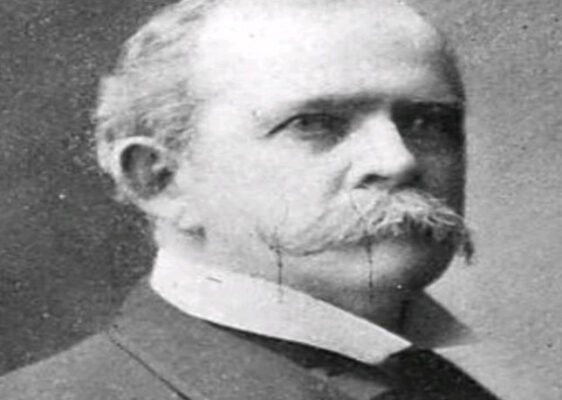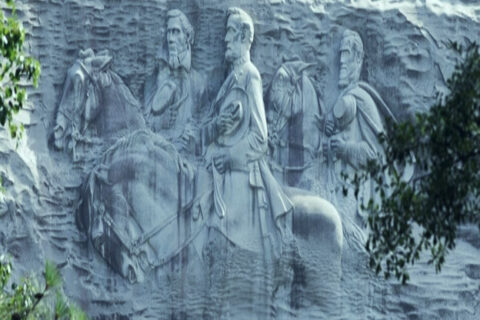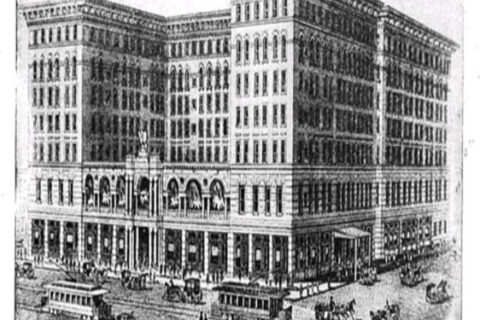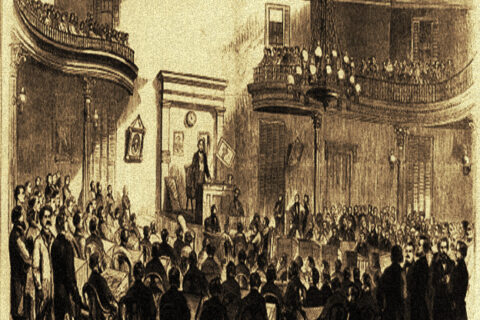(Note to readers: As previously stated, the length of Judge Rogers’s 1903 oration at New Orleans requires that it be divided into several more or less equal parts, the first of which (Judge Rogers’s introductory remarks) may be read here. This second (of six, or perhaps even seven) part consists largely in explaining why, as I have personally stated many times over the course of years, “voluntary union equals the right to secession.” I will, herein, resist the temptation to expound upon the principle contained in the slogan just quoted, for this is precisely what Judge Rogers so ably does in the portion of his speech below-posted. Moreover, all will agree that Judge Rogers is certainly due more credit and more authority on the subject and subject matter than is yours truly, or any other modern writer who dares to broach this topic, for that matter. Be it known in any case that we here at ID haven’t the time, if we had the desire, to feverishly work to “win the hearts and minds” of those who, concerning the subject under investigation, have hardened their hearts and closed their minds. For my own part, “been there, done that,” perfectly encapsulates my past experiences attempting to “win the hearts and minds,” or to “win them over with kindness” nonsense. No; what we’re here to do is to “preach to the choir,” or, more properly, to the congregation. For, you see, our little oasis here is comparable to a church; a church filled with congregants who, to our minds, are eager to hear the unabashed truth; the unmitigated truth boldly espoused and lived, and, yes, preached, by our glorious Confederate ancestors and their chosen mouthpieces, before and during the WBTS, and in its disastrous aftermath. It is, therefore, without further ado that I give you Part II of Judge Rogers’s speech. -TM)
“I find no fault with the New England States, that from the moment the Pilgrim Fathers touched foot on Plymouth Rock they began and have continued day-by-day to record their own deeds; but it cannot be truthfully said that their writers and statesmen have always been as just and faithful in their interpretation and treatment of the actions of others as they have been diligent in recording their own deeds, and afterwards in escaping their responsibility and logical consequences. It is a misfortune to the South that her sons, if not indifferent, then carelessly neglected to preserve for the historian like records.
“The true record of the South, if it can be related with historic accuracy, is rich in patriotism, in intellectual force, in civic and military achievements, in heroism, in honorable and sagacious statesmanship, of a proper share of which no American can afford to deprive himself. So much genius in legislation, in administration, in jurisprudence, in war, such great capacities, should expel partisan and sectional prejudices.
“Let us see where the seeds of disunion were first sown – where and when it was first agitated, and under what circumstances it was threatened. If, to the doctrine of disunion or secession, odium should attach, then simple justice demands that the responsibility be fixed and that the guilty be not permitted to escape their proper place in history. If no odium could justly attach, no one need feel any dread if the truth is made clear. In no sectional, party, or resentful spirit is the inquiry made. It is due to us, to the truth, to our children, and to the statesmen and leaders of political thought in the old South, that the inquiry be made; it is due to the dead we, this day, honor.
“For much of what I shall say on this subject, I am indebted to Dr. Curry’s two books, already mentioned. The South is reproached for disunion – secession! It is the basis for the charge of treason; of disrupting the Union; of violating the Constitution; of rebellion; of making war on the United States. It must not be forgotten that there is a wide difference between secession and rebellion. The South made no war on the States remaining in the Union. Secession meant disunion so far as the seceding States were concerned, but it meant neither war nor rebellion. It meant a Union intact so far as all the States were concerned which did not secede, and a Union, too, under the Constitution.
“As the States entered the Union, each under acts of ratification of its own, so secession meant the resumption by each State of its delegated powers, by repealing the acts under which each seceding State entered the compact; but the repeal of such acts did not and could not affect the acts by which the remaining States entered into the Confederacy. The States of North Carolina and Rhode Island did not ratify the Constitution until long after Washington’s administration began, and of course were not members of the Union. But the Union existed nevertheless, and existed under the Constitution, as much as it did after these States became members. So when the Confederate States seceded from the Union, the States remaining under the compact were as much a Union under the Constitution as before.
“The whole history of secession shows conclusively that in seceding the South had no intention of assailing their former confederates. To their credit, every step taken in the matter of secession, in view of the deep feeling and intense excitement, was marvelously conservative, marked with statesmanlike conduct, and a decent regard for the United States. Its peace commissions, its diplomacy, its unpreparedness for war, all make clear to those who wish to know that the South sought a peaceful withdrawal from the Union, leaving the remaining States unharmed and undisturbed.
“Had a State, under the Constitution as interpreted and understood for fifty years after its adoption, the right, for any reason, to withdraw from the Union? It must be admitted that if such right ever existed it continued up to the “Civil War,” for the Constitution had never been changed in that regard. It must also be admitted that if, for any reason, a State had the right to withdraw of necessity it had the sole right to determine when the reasons were sufficient; and it must also be remembered that up to 1861 the question was unsettled, since for its determination no tribunal had ever been created, nor was any such power confided by the terms of the Constitution to the United States. These statements, it is confidently asserted, are historically axiomatic.
“I may be permitted to quote two authorities. Mr. Madison has been justly called the “Father of the Constitution.” If any men of his day had a right to love the Union, they were Washington and Madison. Both of them contributed, above all others, to its existence and early maintenance; both of them deprecated its destruction, frowned upon all efforts for disunion or secession, and to the last days of their lives were its ardent and devoted friends. Mr. Madison, than whom no purer and nobler statesman this country has produced, said:
Where resort can be had to no tribunal superior to the authority of the parties, the parties themselves must be the rightful judges in the last resort, whether the bargain made has been pursued or violated. The Constitution of the United States was formed by the sanction of the States, given by each in its sovereign capacity. The States then, being parties to the constitutional compact and in their sovereign capacity, it follows of necessity that there can be no tribunal above their authority to decide, in the last resort, whether the compact made by them be violated, and consequently that, as the parties to it, they must themselves decide, in the last resort, such questions as may be of sufficient magnitude to require their interposition.
“An assemblage of citizens of Boston in Faneuil Hall in 1809 states, in a celebrated memorial, that they looked only to the State Legislatures, who were competent to devise relief against the unconstitutional acts of the general government. “That your power is adequate to that object is evident from the organization of the Confederacy.”
“Here is distinctively recognized the doctrine that each sovereign State has the right to judge alone of its own compacts and agreements. This must, of necessity, be true unless the right to interpret the compact or agreement has been waived, or the power conferred upon another. This language of Madison is buttressed by the acts of ratification of the Constitution by some of the States. Virginia said in her ratification act:
The delegates do, in the name of Virginia, declare and make known that the powers granted under the Constitution, being derived from the people of the United States, may be resumed by them whensoever the same shall be perverted to their injury or oppression, and that every power not granted thereby remains with them and at their will.
“New York was even more specific, and Maryland and other States showed equal concern and jealousy in safeguarding the sovereignty of the States. In the prior history of the country repeated instances are found of the assertion of the right of secession and of a purpose entertained at various times to put it into execution. Notably is this true of Massachusetts – indeed, of all New England. In 1786, when the States were bound by the Articles of Confederation, we are told the situation was “dangerous in the extreme.”
“The agitation in Massachusetts was great, and it was declared that if Jay’s negotiations, closing the Mississippi for twenty years, could not be adopted it was high time for the New England States to recede from the Union and form a Confederation by themselves.
“Plumer traces secession movements in 1792 and 1794, and says:
All dissatisfied with the measures of the government looked to a separation of the States as a remedy for op- pressive grievance.
“In 1794 Fisher Ames said:
The spirit of insurrection has tainted a vast extent of country besides Pennsylvania.
“In 1796 Gov. Wolcott, of Connecticut, said:
I sincerely declare that I wish the Northern States would separate from the Southern the moment that event [the election of Jefferson] shall take place.
“Horatio Seymour, on October 8, 1880, in a public address in New York City, thus spoke:
The first threat of disunion was uttered upon the floor of Congress by Josiah Quincy, one of the most able and distinguished sons of Massachusetts. At an early day Mr. Hamilton, with all his distrust of the Constitution, sent word to the citizens of Boston to stop their threats of disunion and let the government stand as long as it would. When our country was engaged with the superior power, population, and resources of Great Britain, when its armies were upon our soil, when the walls of its capitol were blackened and marred by the fires kindled by our foes, and our Union was threatened with disasters, the leading officials and citizens of New England threatened resistance to the military measures of the administration. This was the language held by a convention of delegates appointed by the Legislatures of three New England States and by delegates from counties in Vermont and New Hampshire: ‘In cases of deliberate, dangerous, and palpable infractions of the Constitution, affecting the sovereignty of a State and liberties of the people, it is not only the right but the duty of such State to interpose for their protection in the manner best calculated to secure that end. This covers the whole doctrine of nullification.’ I may add, it covers the whole doctrine of secession, for it recognized the right of the State to determine when infractions of the Constitution have occurred. and to apply their own remedies.
“The men who uttered these threats, which gave “aid and comfort” to the enemies of this country while they were burning its capitol, were held in high esteem. To this day the names of George Cabot, Nathan Dove, Roger M. Sherman, and their associates are honored in New England.
“The acquisition of Louisiana, in 1803, created much dissatisfaction throughout New England, for the reason, as expressed by George Cabot, Senator from Massachusetts, and the grandfather of Senator Henry Cabot Lodge (in whose “Life of George Cabot” the statement is made): “That the influence of our [northeastern] part of the Union must be diminished by the acquisition of more weight at the other extremity.”
“At the time secession, or separation of the States, was freely discussed, and with no suggestion of any idea among its advocates that it was treasonable or revolutionary. Col. Timothy Pickering, an officer in the Revolution, afterwards Postmaster General, Secretary of War, and Secretary of State in Washington’s Cabinet, and afterwards for many years a Senator from Massachusetts, was also a leading secessionist in his day.
“In Lodge’s “Life of Cabot,” his letters to Senator Cabot reveal his convictions of the power in a sovereign State to sever its connection with the Union. In one of his letters, written in 1803 to a friend, he says:
I will not despair. I will rather anticipate a new Confederacy, exempt from the corrupt and corrupting influences and oppressions of the aristocratic Democrats of the South. There will be (our children at the furthest will see it) a separation. The white and black populations will mark the boundary.” In another letter he says: “The principles of our Revolution point to the remedy – a separation; that this can be accomplished without spilling one drop of blood, I have little doubt.
“Other quotations to the same point found in the letters of Col. Pickering might be given. The occasion forbids. Such were his views of the nature of the compact under the Constitution. He was a revolutionary patriot, a friend and associate of Washington, and a trusted servant, during many long years, of Massachusetts.” […]
[To be continued in Part III]







I appreciate your opening disclaimer: “we here at ID haven’t the time, if we had the desire, to feverishly work to “win the hearts and minds” of those who, concerning the subject under investigation, have hardened their hearts and closed their minds.”
As Degrelle said in a 1992 address ‘An Appeal to Young Europeans’ — newly published and translated by Alexander Jacob, Uthwita Press, ‘Messages to the Youth of Europe’:
“A hundred objective studies of scholars or specialists … will reach with much difficulty two or three thousand readers, whereas the gigolo of the screen will have two or three million dumbstruck spectators conquered in advance by his twaddle.”
Judge Rogers’ facts are irrefutable, but for most of those outside the congregation, nothing is more insulting than the truth.